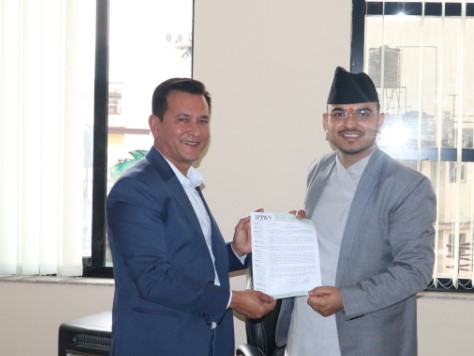IPPAN Presses Insurance Authority to Enforce Detariff Agreement for Hydropower Projects

Kathmandu — The Independent Power Producers’ Association of Nepal (IPPAN) has called on the Insurance Authority to act on a long-pending agreement aimed at detariffing insurance premiums for hydropower projects. Despite a mutual understanding reached between IPPAN and the Nepal Insurance Association last year, implementation remains stalled, prompting renewed demands for action.
At a meeting held on Tuesday, IPPAN Chairman Ganesh Karki urged newly appointed Insurance Authority Chairman Sharad Ojha to enforce the agreement and address persistent issues surrounding premium hikes and claim delays. IPPAN criticized the steep increase in insurance premiums up to 500 percent in some cases under the current Minimum Premium Directive issued in 2078, which has made project coverage financially unsustainable for many developers.
IPPAN also raised concerns over prolonged delays in claims settlements, with some hydropower projects reportedly waiting up to a year to receive payments. Such delays, compounded by the late deployment of underqualified surveyors, have led to extended reconstruction periods and even loss of license validity during downtime, according to Karki.
Despite having agreed to a detariff model last year, the authority has yet to take concrete steps toward implementation. IPPAN insists that while natural disasters may have affected a handful of projects, it is not grounds to abandon broader reform efforts that benefit the majority.
The challenges extend to reinsurance practices as well. IPPAN Vice President Uttam Bhlon pointed out that domestic reinsurers often refuse hydropower coverage despite demanding a share in other segments, raising concerns among international reinsurance partners as well.
In response to mounting premiums, some developers are paying millions more in annual insurance costs without having ever filed a claim. This disparity, IPPAN argues, underscores the need for a more balanced and risk-based pricing system.
IPPAN also highlighted flaws in damage assessment processes, noting that surveyors with mechanical engineering backgrounds—typically experienced in auto evaluations lack the expertise needed for hydropower-specific assessments. A formal classification of surveyors has been proposed to address this gap.
Insurance Authority Chairman Ojha acknowledged the complexity of the issue, emphasizing the need for careful study before adopting a suitable model for Nepal. He noted that while detariffing succeeded in the U.S., it led to regulatory setbacks in India. He reaffirmed that insuring the energy sector remains a government priority.
Meanwhile, the Authority’s Executive Director, Sushildev Subedi, floated the idea of establishing a hydropower insurance pool in lieu of forming a separate insurance company, citing feasibility concerns. The pool would streamline coverage by assigning one insurer per corridor and may include mechanisms to ensure interest payments for delayed claims—another provision long overdue for enforcement.
